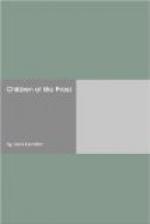“To not say that the quass was good were insult; to spit forth upon the ground were worse than insult. And this very thing did he do. He was known for a chief over the Sticks of the Yukon, and further naught was known of him.
“As I say, it was an insult. But mark this, O Hair-Face: it was an insult, not to Niblack the feast-giver, but to the man chiefest of rank who sat among those of the circle. And that man was Ligoun. There was no sound. All eyes were upon him to see what he might do. He made no movement. His withered lips trembled not into speech; nor did a nostril quiver, nor an eyelid droop. But I saw that he looked wan and gray, as I have seen old men look of bitter mornings when famine pressed, and the women wailed and the children whimpered, and there was no meat nor sign of meat. And as the old men looked, so looked Ligoun.
“There was no sound. It were as a circle of the dead, but that each chief felt beneath his blanket to make sure, and that each chief glanced to his neighbor, right and left, with a measuring eye. I was a stripling; the things I had seen were few; yet I knew it to be the moment one meets but once in all a lifetime.
“The Stick rose up, with every eye upon him, and crossed the room till he stood before Ligoun.
“‘I am Opitsah, the Knife,’ he said.
“But Ligoun said naught, nor looked at him, but gazed unblinking at the ground.
“‘You are Ligoun,’ Opitsah said. ’You have killed many men. I am still alive.’
“And still Ligoun said naught, though he made the sign to me and with my strength arose and stood upright on his two feet. He was as an old pine, naked and gray, but still a-shoulder to the frost and storm. His eyes were unblinking, and as he had not heard Opitsah, so it seemed he did not see him.
“And Opitsah was mad with anger, and danced stiff-legged before him, as men do when they wish to give another shame. And Opitsah sang a song of his own greatness and the greatness of his people, filled with bad words for the Chilcats and for Ligoun. And as he danced and sang, Opitsah threw off his blanket and with his knife drew bright circles before the face of Ligoun. And the song he sang was the Song of the Knife.
“And there was no other sound, only the singing of Opitsah, and the circle of chiefs that were as dead, save that the flash of the knife seemed to draw smouldering fire from their eyes. And Ligoun, also, was very still. Yet did he know his death, and was unafraid. And the knife sang closer and yet closer to his face, but his eyes were unblinking and he swayed not to right or left, or this way or that.
“And Opitsah drove in the knife, so, twice on the forehead of Ligoun, and the red blood leaped after it. And then it was that Ligoun gave me the sign to bear up under him with my youth that he might walk. And he laughed with a great scorn, full in the face of Opitsah, the Knife. And he brushed Opitsah to the side, as one brushes to the side a low-hanging branch on the trail and passes on.




